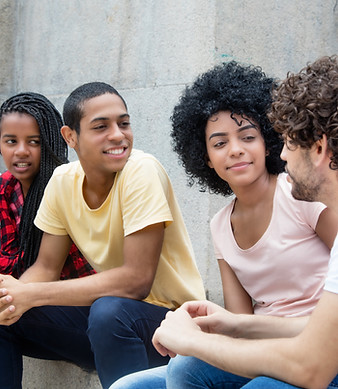

Social
Creative writing clubs can build students' sense of connection to those around them. These clubs can help students find community at school, and/or they can build students' overall social awareness.
Social Skills
In Elizabeth Acevedo's novel The Poet X, the titular character marvels at how her school's poetry club pulls such "strange strangers" into the same room (Acevedo, 2018, pg. 183). Indeed, creative writing clubs tend to attract wide varieties of students. When leveraged purposefully, these groups can forge unlikely friendships. Most importantly, they can lead to positive social networks for students who are otherwise isolated.
Many have noted that creative writing clubs can create positive bonds between students (Johnson, 2017; Lawton, 2021; Bigalk, 2014). This research is consistent with findings that indicate that extracurriculars can help students feel connected to their school environments (Covay and Carbonaro, 2010; Hensch, 2020; Eccles et al., 2003; Philips et al., 2021). Most notably, experienced facilitator Cassandra Lawton (personal communication, 2022) observes that members of creative writing clubs tend to create long-lasting bonds among participants.

It is not surprising that these clubs are such fertile groups for friendship. Between the personal and imaginative nature of writing, these clubs offer many opportunities for students to get to know each other. Some ways that facilitators can promote social skills are creating group norms, promoting purposeful listening, and providing ways for students to get to know each other.
Social Awareness
Rudine Sims-Bishop (1991) famously described books as "mirrors, windows, and sliding glass doors." This well-known metaphor describes how literature can reflect a reader's life and also expose them to unfamiliar worlds and ideas. Likewise, creative writing clubs can allow students to both discover similarities and profound differences among themselves and their classmates. This process of discovery can improve their understanding of themselves and others. Additionally, these clubs can help facilitators gain a greater understanding of their students.
Unsurprisingly, the same research that supports creative writing clubs' ability to promote friendships also reveals that these clubs help students understand each other (Bigalk, 2014; DeMark, 2016; Johnson, 2017; Siskel & Jacobs, 2011). Particularly, the documentary Louder Than a Bomb is a powerful example of how a slam poetry competition in Chicago promotes students' understanding of each other (Siskel & Jacobs, 2011).

Through supportive sharing, purposeful feedback protocols, and diverse mentor texts, creative writing clubs can help stduents gain a greater understanding of the worlds around them.
Social Justice
Since its invention, the pen has been a tool of social change. Writers continually use language to give voice to marginalized experiences, expose injustice, and challenge dangerous practices. Creative writing clubs can harness that legacy in numerous ways.
There is exciting scholarship around using creative writing communities to bring about positive social change. Most notably, Felicia Rose Chavez's book The AntiRacist Writing Workshop (2021) outlines the ways in which creative writing spaces can re-orient towards uplifting, rather than silencing, marginalized voices. Johnson (2017) also provides powerful insight into how one creative writing group gave voice to students who were marginalized because of their race and sexual orientations. Siskel & Jacobs's (2011) documentary provides excellent insight into the organization Young Chicago Authors, a group that continues to combine spoken word poetry wtih social acton.

Even providing a space where all students feel safe, heard, and appreciated is a part of social change. Creative writing clubs can can give this to students, but they can also go further. Validating linguistic difference, publishing works that give voice to marginalized experiences, and engaging in community action are also ways that creative writing clubs can be tools for positive social change.